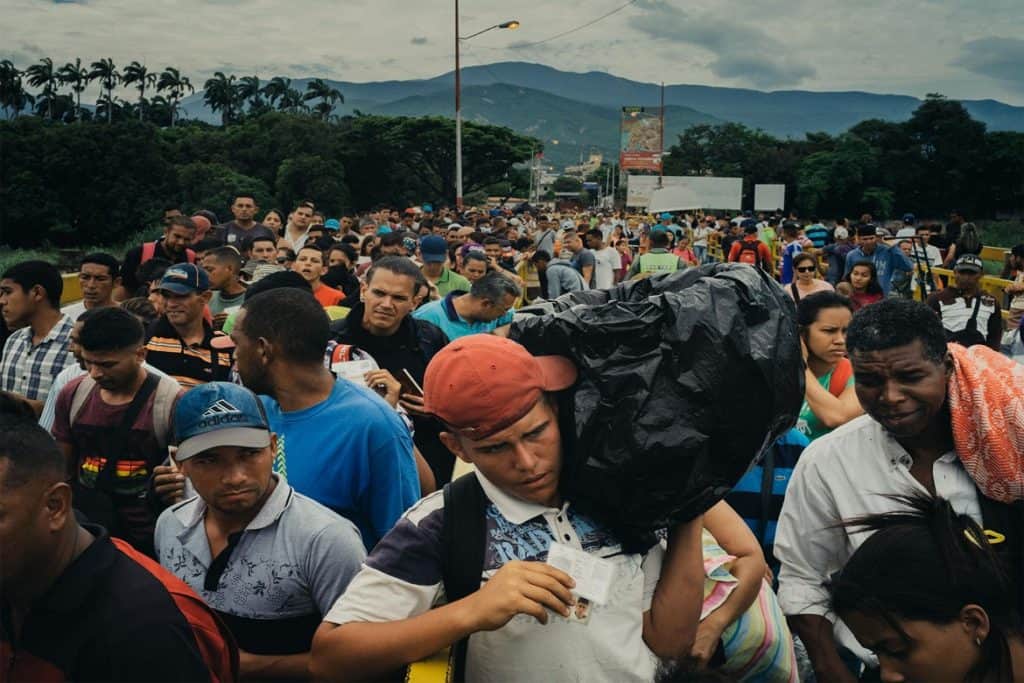María Isabel Niño Rada (Professional Specialized in Presidential Counseling for Human Rights and International Affairs)
According to UNHCR, at least 79.5 million people around the world have been forced to flee their homes. This means that 1% of the world’s population is displaced. 80% of the world’s displaced people are in countries or territories affected by acute food insecurity and malnutrition and 40% of the world’s displaced people are children.
 There are nearly 26 million refugees, people fleeing conflict or persecution that must not be expelled or returned to situations where their life and freedom are at risk. Most of them are forced to flee their countries in order to escape to safety. Around half of them are under the age of 18. Every year, around one million people seek asylum for international protection. There are also near 4.2 millions of stateless people, who have been denied a nationality and lack access to basic rights such as education, health care, employment and freedom of movement.
There are nearly 26 million refugees, people fleeing conflict or persecution that must not be expelled or returned to situations where their life and freedom are at risk. Most of them are forced to flee their countries in order to escape to safety. Around half of them are under the age of 18. Every year, around one million people seek asylum for international protection. There are also near 4.2 millions of stateless people, who have been denied a nationality and lack access to basic rights such as education, health care, employment and freedom of movement.
On the other hand, approximately 45.7 million people are internally displaced people (IDPs), which means they have not crossed a border to find safety. Unlike refugees, they are on the run at home. IDPs stay within their own country but often move to areas where it is difficult to deliver humanitarian assistance and as a result, these people are among the most vulnerable in the world.
States have a fundamental obligation to protect these people who have had to leave their homes due to conflict, persecution and other crises, but this duty is hard to accomplish when 85% of displaced people worldwide are hosted in developing countries, amid their own economic and security challenges. This situation is a great challenge for these States, especially since the number of forced displaced people in the world reached a record in 2019, almost doubling the number of people in crisis registered a decade ago, due to the war, the violence, persecution and other emergencies.
The conflict in Syria – which is experiencing its ninth year of conflict and has 13.2 million refugees, asylum seekers and internally displaced people- and the inclusion of the displaced from Venezuela, many of whom are not legally registered as refugees or asylum seekers, have contributed to this trend. These two countries are in the top of the list of countries with the largest number of people who have been forced to leave. Also, new displacements in 2019, particularly in the Democratic Republic of the Congo, the Sahel and Yemen have increased the number of displaced people around the world.
The other side of the coin is formed by Turkey and Colombia, the two countries that have received the largest number of displaced people. This is not a coincidence, considering that 73% of displaced people are hosted in neighboring countries, so displaced from Syria have emigrated to Turkey and displaced from Venezuela to Colombia. These countries are followed by Pakistan, Uganda and Germany. Colombia also has the highest number of internally displaced people in the world, with about 8 million according to government statistics.
The urge of having answers to respond to this crisis led to the first-ever Global Refugee Forum, aimed to reboot responses for the millions uprooted by wars and persecution and to support the communities that host them. Some of the pledges and for refugees and their hosts were the following:
It is important to support refugees living outside camps, to strengthen asylum systems, refugees’ access to work and financial services, and the inclusion of refugees in national and local development plans and national systems for education and health. Since around half of the world’s refugees are children, it is vital to expand the access to quality education for children refugees and their hosts.
While away from their homes, refugees want to work. It is important to make commitments towards job creation, work in digital services, microfinance, and women’s economic empowerment. On the other hand, support infrastructural services, including health, water, sanitation, and hygiene, connectivity, and shelter must be priorities.
It is necessary to strengthen the host countries national policies, to make them more inclusive towards migrants and refugees. Also, there is an urge to recognize the importance of protection for individuals with diverse specific needs. This must include commitments to address sexual violence, empower women and girls, address disability, and include refugees in decisions that affect them.
In order to achieve lasting solutions, some host countries have pledged to integrate specific groups of refugees and several countries of origin have pledged to create conditions for refugees to return in the longer term by announcing efforts to resolve conflicts, promote the rule of law and build peace. To achieve that, it is important to use political and financial resources to address the root causes of displacement.
Furthermore, refugees and displaced people are among the most vulnerable demographic groups to the impact of the coronavirus pandemic, so these governments must also ensure that the displaced population is included in the response and recovery. The additional complications that the coronavirus pandemic causes to refugees and migrants around the world require an inclusive socioeconomic and public health response. It is vital to defend human dignity against the pandemic and to learn from the few countries that applied travel restrictions and border controls while respecting human rights and international principles of refugee protection. It must be borne in mind that diagnosis, treatment and vaccines must be accessible to all.
Displaced people are part of the solution to this crisis and they have joined the first line of response to COVID-19. From camps in Bangladesh to hospitals in Europe, refugees are working as nurses, doctors, scientists and teachers, giving back part of what they have received from the communities that host them. Refugees have the ability and determination to rebuild their lives and help improve those around them.
Author: María Isabel Niño Rada (Professional Specialized in Presidential Council for Human Rights and International Affairs; Lawyer and professional in International Relations from the Universidad del Rosario, Colombia; Diploma in International Protection of the Human Rights of Women from the Universidad Austral, Argentina. She is currently enrolled in a Postgraduate degree in Constitutional Law at the Pontificia Universidad Javeriana. Bogotá D.C. Area, Colombia)
(The views expressed in this article belong only to the author and do not necessarily reflect the views of World Geostrategic Insights)
Image Credit: GREG KAHN/National Geographic







